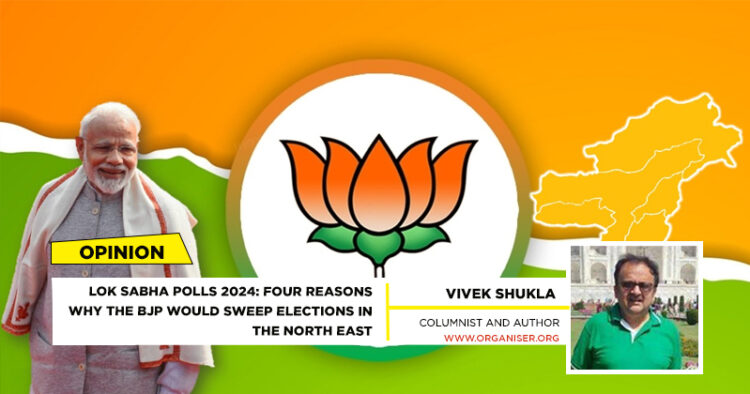The North-Eastern region of India, where the sun’s rays first reach, is ready to deliver its verdict in the upcoming Lok Sabha elections. The Bharatiya Janata Party (BJP) is aiming to win 370 seats in these elections, including all 25 seats from the Northeast. Looking back at the 2019 Lok Sabha elections, the BJP had secured significant victories in the Northeast, and the party is confident of maintaining its hold this time as well.
This confidence stems from Prime Minister Narendra Modi’s belief that the people of the Northeast will not forget the development initiatives his government has undertaken in the region. Additionally, Home Minister Amit Shah, like PM Modi, has played a crucial role in establishing lasting peace in the Northeast through various peace accords. Due to robust internal security measures, there have been no major violent incidents reported across the region, with the exception of Manipur, where the Home Ministry is actively working towards a concrete solution.
India’s Northeast comprises the eight border states of Arunachal Pradesh, Assam, Manipur, Meghalaya, Mizoram, Nagaland, Sikkim, and Tripura. The region accounts for 25 seats in the 543 Lok Sabha, the lower house of the Indian Parliament. States in the region will vote on April 19 and 26 and May 7.
Assam holds the highest number with 14 seats. In the 2019 Lok Sabha elections, the NDA secured 21 out of the 25 seats. The BJP aims to surpass this figure in the upcoming elections.
Assam Chief Minister Himanta Biswa Sarma of the BJP, who is convener of the North East Democratic Alliance, a BJP-led bloc in the Northeast, claims that the NDA would win 22 seats across the region in the upcoming general elections. Discussions with political functionaries from different parties revealed that the BJP and its allies have an edge in 20 constituencies. The contest in the remaining five is expected to be tough.
In Assam, which has the highest number of seats (14) among all the northeastern states, the ruling BJP has fielded candidates in 11 constituencies, and its allies – the Asom Gana Parishad (AGP) and the United People’s Party Liberal (UPPL) – will contest from the remaining three. In 2019, the BJP won 9 seats from Assam. The UPPL and AGP failed to secure victories from their allocated constituencies.
So far, the I.N.D.I. Alliance has not shown any significant interest or investment in the northeastern states. Mamata Banerjee’s TMC and Sharad Pawar’s NCP had made independent attempts to gain a foothold in the region during the previous elections, but this time, their efforts seem to be absent. This is primarily because Sharad Pawar is currently engaged in a battle with his nephew to maintain control over his party and political existence. Similarly, Mamata Banerjee is facing challenges at home due to allegations of corruption and communal disturbances.
The trust placed in the BJP by the people of the Northeast stems from the active focus on development and peace initiatives undertaken by PM Modi and Home Minister Amit Shah over the past decade.
Although Manipur has only 2 Lok Sabha seats, resolving the ongoing tribal conflict there is crucial for the government. Home Minister Amit Shah has been making continuous efforts in this regard. In his recent meeting in Shillong, Amit Shah said that the last 10 years under the leadership of Prime Minister Narendra Modi have been the most significant for the development of the North East in the 75 years since independence.
In these 10 years under the leadership of Modi ji, not only the distance from North East to Delhi and the rest of India has reduced due to the creation of infrastructure, but the difference of hearts has also reduced. The Northeast, which was struggling with various ethnic, linguistic, border and extremist groups related problems, has also got the beginning of a fresh and durable era of peace in these 10 years.
It goes without saying that if these 10 years for the Northeast are compared with the 75 years after the country’s independence, then this decade will definitely be considered as the Golden period of the Northeast.
In a recent historic development, the Government of India and the Government of Manipur signed a peace agreement with the United National Liberation Front (UNLF), one of the oldest armed groups in Manipur. This agreement paves the way for a new era of peace in the Northeast in general, and Manipur in particular. It marks the first time that a valley-based Manipuri armed group has agreed to renounce violence, return to the mainstream, and respect the Constitution of India and the country’s laws.
The agreement will not only end hostilities between the UNLF and security forces, which have claimed thousands of lives over the past half-century but will also provide an opportunity to address the community’s long-standing concerns. The UNLF has been active since 1964, operating both within and outside Indian territory.
Following the Modi government’s arrival, ULFA, Assam’s oldest insurgent group, agreed to renounce violence, disband the organisation, and fully participate in the democratic process. Amit Shah has consistently maintained that insurgents are misleading individuals. He believes that if they are provided with employment opportunities, security, and a vision of a new India, they will abandon violence and choose to join the mainstream. The surrender of ULFA cadres is a testament to this belief. Shah’s policies have successfully led to the surrender of over 9,000 cadres involved in insurgencies across the North East.
Meanwhile, the Union Government is making all possible efforts to support the development of sports in the North- Eastern states through funding. All essential steps are being taken to support the NE States, and the Government is positively and continuously sanctioning the proposals received from the NE, including Nagaland. Under the Khelo India Scheme, the second Khelo India Games were held in Guwahati. Given this backdrop, it looks that NE states would give positive results to BJP in the forthcoming Lok Sabha election.


















Comments